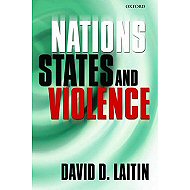|
Nations, States and Violence
|
|
David D. Laitin
|

|

Nations, States, and Violence presents a revisionist view of the sources of nationalism, the relationship of the nation to culture, and the implications of nationalism and cultural heterogeneity for the future of the nation-state. It accepts the now-standard view that national identities are not inherited traits but constructed communities in order to serve political ends. But the resulting national identities do not emerge from some metaphorical plebiscite as had been suggested by some; rather they result from efforts by people to coordinate their identities with people who share at least some cultural traits with them. Coordination leads to powerful social and cultural ties that are hard to unravel, and this explains the persistence of national identities.
Understood as the result of coordination dynamics, the implications of national homogeneity and heterogeneity are explored. The book shows that national heterogeneity is not, as it is sometimes accused of being, a source of hatred and violence. Nonetheless, there are advantages to homogeneity for the production of public goods and economic growth. Whatever the positive implications of homogeneity, the book shows that in the current world, classic nation-states are defunct. Heterogeneity is proliferating not only due to migration but also because small groups in many states once thought to be homogeneous are coordinating to demand national recognition. With the prohibitive costs of eliminating cultural heterogeneity, citizens and leaders need to learn how best to manage, or even take advantage of, national diversity within their countries. Management of diversity demands that we understand the coordination aspects of national heterogeneity, a perspective that this book provides. […]
David D. Laitin […] received his Ph.D. in Political Science from UC Berkeley, working under the direction of Ernst Haas and Hanna Pitkin [...] he has conducted field research in Somalia, Yorubaland, Catalonia and Estonia, focusing on issues of language and religion ' and how these cultural phenomena link nation to state. His books include "Politics, Language and Thought: The Somali Experience", "Hegemony and Culture: Politics and Religious Change Among the Yoruba", and "Identity in Formation: The Russian-Speaking Populations in the Near Abroad" […]
|
|
